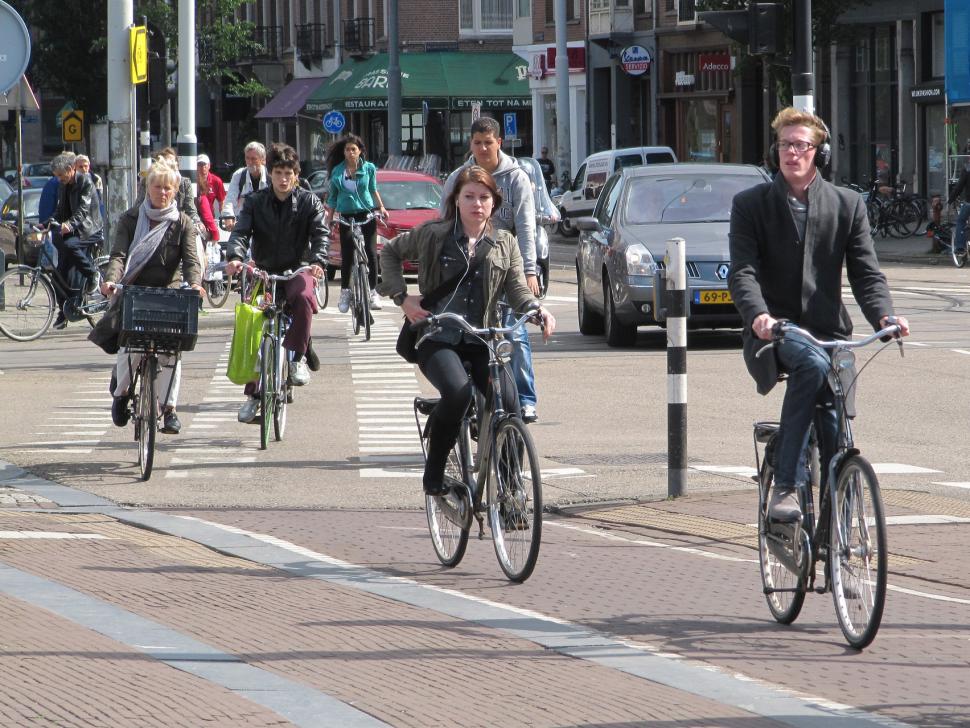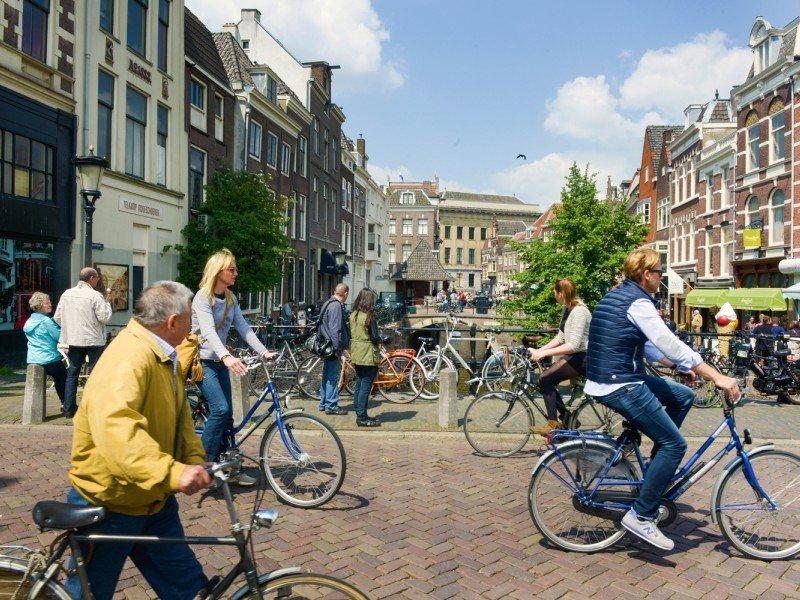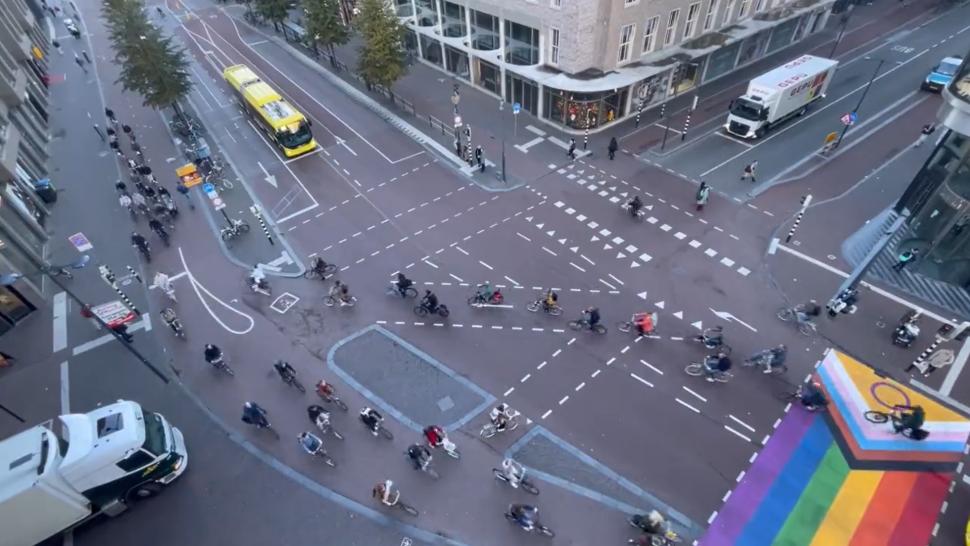- News
- Reviews
- Bikes
- Accessories
- Accessories - misc
- Computer mounts
- Bags
- Bar ends
- Bike bags & cases
- Bottle cages
- Bottles
- Cameras
- Car racks
- Child seats
- Computers
- Glasses
- GPS units
- Helmets
- Lights - front
- Lights - rear
- Lights - sets
- Locks
- Mirrors
- Mudguards
- Racks
- Pumps & CO2 inflators
- Puncture kits
- Reflectives
- Smart watches
- Stands and racks
- Trailers
- Clothing
- Components
- Bar tape & grips
- Bottom brackets
- Brake & gear cables
- Brake & STI levers
- Brake pads & spares
- Brakes
- Cassettes & freewheels
- Chains
- Chainsets & chainrings
- Derailleurs - front
- Derailleurs - rear
- Forks
- Gear levers & shifters
- Groupsets
- Handlebars & extensions
- Headsets
- Hubs
- Inner tubes
- Pedals
- Quick releases & skewers
- Saddles
- Seatposts
- Stems
- Wheels
- Tyres
- Health, fitness and nutrition
- Tools and workshop
- Miscellaneous
- Buyers Guides
- Features
- Forum
- Recommends
- Podcast
news
 Better facilities, like these in the Netherlands, woiuld encourage people to cycle more (CC BY-NC-SA 2.0 licenced by MarkA:Flickr)
Better facilities, like these in the Netherlands, woiuld encourage people to cycle more (CC BY-NC-SA 2.0 licenced by MarkA:Flickr)Dutch government and neurologists call on cyclists to wear helmets – but cyclists’ union says “too much emphasis” on helmets discourages cycling and “has an air of victim blaming”
The Dutch Cyclists’ Union has admitted that it may be a “wise decision” to wear a bike helmet on a voluntary basis, but urged against placing too much emphasis on helmet use – which the group argued can actually discourage cycling and instil a victim blaming culture in the famously cycling-friendly nation – after local authorities, the government, and neurologists urged people in the Netherlands to don a helmet when travelling around by bike.
Next month, the Netherlands’ transport ministry will introduce new guidelines on voluntary helmet use, after provinces such as Utrecht ran a campaign in May offering a €25 discount on helmet purchases.
Gelderland, meanwhile, is currently in the midst of its own campaign which attempts to raise awareness of helmet use and promote “behaviour change” in elderly cyclists, with people over 60 accounting for almost half of all seriously injured cyclists in the Netherlands.
> Dutch surgeons call on people to wear helmets while cycling
In a country with a distinct, deeply embedded cycling culture and where 28 per cent of all journeys are made by bike, only 3.5 per cent of Dutch cyclists wear helmets, which are usually confined to the nation’s sport or leisure cyclists.
However, calls for the Netherlands’ fietsers, its everyday cyclists, to wear helmets while out and about have been increasing in volume in recent years, as the number of cyclists seriously injured each year has risen by 27 per cent over the past decade, according to injury prevention organisation Veiligheid NL.
The Dutch Institute for Road Safety Research has also claimed that if all Dutch cyclists wore helmets, fatalities on the road would drop by 85 each year, and the number of serious injuries reduced by 2,500.
In 2022, 88,000 cyclists were injured in the Netherlands, making up 66 per cent of all casualties on the road. Around half of those collisions involved a motorist.
> Cyclists wearing helmets seen as "less human" than those without, researchers find
In light of these figures, two of the Netherlands’ leading road safety researchers, Fred Wegman and Paul Schepers, questioned whether the country could truly be said to support Vision Zero and similar initiatives without addressing the problem of head injuries suffered by cyclists not wearing helmets – even calling on the Netherlands to potentially follow Australia’s lead by introducing an obligatory helmet law.
“Modifications to cars can reduce injury in a collision, but in single-bicycle crashes, a helmet is one of the few possible measures to prevent serious head injuries,” Wegman and Schepers said.
“In case of a fall or crash, the use of a bicycle helmet was found to reduce serious head/brain injury by 60 per cent and fatal head/brain injury by 71 per cent on average, while it is found that the protective effect is the same for children and adults.
“In summary, wearing a helmet while cycling reduces the risk of head and brain injuries, and this reduction is higher for more severe injuries. A helmet obligation could be more effective than encouraging voluntary wearing.
“Perhaps the latter may be needed to increase support in the Dutch society for an obligation. Helmet use by cyclists seems to be a very relevant contribution towards zero cycle casualties in the Netherlands.”
> Why is Dan Walker’s claim that a bike helmet saved his life so controversial?
Meanwhile, a number of medical experts have also called for more frequent use of helmets, with Evert Pronk, the deputy editor of the Medical Contact journal, declaring his support for the campaign by admonishing those who purportedly refuse to wear helmets “because they don’t look good” in an article that featured the headline: “Looks good on you, a skull fracture”.
“I’m a huge fan of cycling but it’s important to protect ourselves,” neurologist Myrthe Boss, whose mother died after being hit by a motorist on a roundabout while cycling in 2019, told the Guardian this week.
“The brain is a very vulnerable organ with limited capacity to recover. If you fall from a bike and sustain a brain injury, this has long-term consequences. And a large proportion of people who fall while cycling have brain injury.
“A helmet doesn’t prevent everything but it does ensure there is less impact from the street on your head,” Boss said. “You see what it does in your family when you lose someone that way.”
Responding to the increasing calls for helmet use, the Dutch Cyclists’ Union, Fietsersbond, admitted that helmet use has its benefits – but warned against placing too much emphasis on one aspect of bike safety.
“We have the position that helmets don’t prevent accidents but it can be a wise decision to wear one on a voluntary basis,” the union’s director, Esther van Garderen, said.
“Emphasising too much that you should wear a helmet would discourage people from cycling sometimes, though, and has the air of victim blaming.
“I think it’s coming slowly, although there’s no such thing as a society with zero danger and we value our culture where you can cycle safe and free.”
Back in the UK, meanwhile, the bike helmet debate once again made national headlines, after celebrity chef Gordon Ramsay said his helmet meant he was “lucky to be standing here” after crashing heavily while cycling in Connecticut.
“Honestly, you’ve got to wear a helmet,” Ramsay said in an Instagram video in which he showed off the severe bruising to his side caused by the crash.
“I don’t care how short the journey is, I don’t care the fact that these helmets cost money, but they’re crucial. Even with the kids, [on] a short journey, they’ve got to wear a helmet.
“Now I’m lucky to be standing here. I’m in pain, it’s been a brutal week. I’m sort of getting through but I cannot tell you the importance of wearing a helmet. Please, please, please, please wear a helmet – because if I didn’t, I wouldn’t be here now.”
Ryan joined road.cc in December 2021 and since then has kept the site’s readers and listeners informed and enthralled (well at least occasionally) on news, the live blog, and the road.cc Podcast. After boarding a wrong bus at the world championships and ruining a good pair of jeans at the cyclocross, he now serves as road.cc’s senior news writer. Before his foray into cycling journalism, he wallowed in the equally pitiless world of academia, where he wrote a book about Victorian politics and droned on about cycling and bikes to classes of bored students (while taking every chance he could get to talk about cycling in print or on the radio). He can be found riding his bike very slowly around the narrow, scenic country lanes of Co. Down.
Latest Comments
- David9694 2 sec ago
Homeowner calls for safety improvements at junction near Mersham as car smashes into house...
- hawkinspeter 54 min 38 sec ago
Not at all. If there's no fatality, then just apply existing penalties. The idea is to ensure that the victim's friends and family know that at...
- leedorney 6 hours 10 min ago
Imagine a big name being outed like Pogacar or Jonas V, Remco E..what would actually happen - he'd be, ostracized and everyone else would breath a...
- mdavidford 8 hours 19 min ago
Consequences like a random anonymous person posting a sniffy reply. That'll learn 'em.
- Simon E 8 hours 29 min ago
The top-end stuff works by association or reputation. Just like car and motorbike manufacturers spend many millions on racing a vehicle with their...
- ktache 8 hours 34 min ago
The innattention and bad driving had been going on for more than a few seconds, probably years. At least it's a five year ban.
- Cayo 8 hours 55 min ago
Having quite literally been left for dead by a hit and run motorbike rider, unconscious with 3 broken ribs, lung damage and relatively minor damage...
- ktache 10 hours 12 sec ago
I understand that the multi tool is an essential8, so screwdriver bits are available including the JIS 2.
- BikingBud 10 hours 20 min ago
It is interesting to see what may or may not be claimed by people involved in catstrophic incidents:...



Add new comment
192 comments
Pretty much no-one gets to be a regular cyclist without first being a casual cyclist.
Besides which, it's just not true - at least if by 'deterred' you mean 'deterred from specific journeys'. I've certainly had times when I've decided not to cycle because lugging the helmet around with me at the other end would be too much faff (and so would having the argument about why I'm going without a helmet).
I suspect that covers the vast majority of Dutch people, and therefore the negative effects would be enormous.
2 orders of magnitude more lives would be saved by requiring motor vehicle occupants to wear helmets and "only casual drivers" would be deterred by that "inconvenience".
Regular drivers will have considered which part of their life will be better with a brain injury and how likely they are given the rides and behaviour involved.
Where was compulsion mentioned? Massively raised vulnerability to catastrophic head injury isn't a 'benefit'. There is no need for an RCT on being hit on the head by a concrete coated planet. Are you sure you haven't had a nasty tap?
Um, in the article above?
If you can't even use any facts to support your argument then you're just another blind idiot that favours compulsion/coercion.
It's strange how people can drink and smoke themselves to death, eat mountains of shit and expect the NHS to fix them, drive like selfish twats and again expect the fire service & ambulance to retrieve them yet keep harping on about how a little polystyrene hat full of holes is the answer to cyclists' safety. It does absolutely nothing to help vulnerable road users.
Perhaps... even in NL there seems to be a measure of "well - injuries are going up so something must be done". I think it is true that cycling is a bit more dangerous than walking all-told (in NL). But as it happens I haven't seen / can't remember the figures comparing modes - and that gets more difficult to the extent that they operate in different spaces and are used for different types of trip, by different people etc.
Even in NL it seems to depend on where you're coming from. The medics and general safety organisations seem to take a "if it saves one life" approach - just like in the UK. Generally these do look at the big picture using the statistics. But perhaps not the big picture of how modes relate to each other, how public space is divided and what we're wanting from our transport functions?
They're unlikely to ask e.g. "but is more, faster transport actually 'better' ?" Or note that we've massively prioritised one mode and it just so happens that that one is the most space intensive and dangerous, along with supressing other modes.
Anyway for those who are interested (medium to very deep rabbit hole) here are some relevant recent-ish articles:
Bicycle Dutch (blogger) - Cycling Safety - understanding the challenges and searching for solutions - has the figures and some interpretation (like many Dutch people he's not so keen on mandatory helmets) -
David Hembrow (blogger) - What's gone wrong with road safety in the Netherlands? Thinks that if you look at the numbers the change is due to more collisions with cars or worse outcomes from same, because NL has slid back into being further under the thrall of motor transport.
Get it from the relevant bodies - some of the following need translation if you don't read Dutch:
Fietsersbond (NL Cyclists Union)
- The number of bicycle accidents continues to rise. What's going on? (2021 I think)
- Why the cyclists union is against compulsory helmets for cyclists - they say they obviously may help. Note - they don't list helmets in their top 10 measures to improve road safety for cycling.
SWOV (NL road safety institute)
- Deadly traffic accidents on national roads (annual report)
- Factsheet -road Deaths in NL (Sept 2023)
- Factsheet - Serious Road Injuries in NL (Dec 2023)
- of course when you've mass cycling you have to consider all kinds of "whole population" things. See e.g. Effects of crowding on route preferences and perceived safety of urban cyclists in the Netherlands
Veiligheid.nl (general safety organisation)
I think they're kind of "RoSPA" e.g. general accident prevention. I think I've heard they're prone to suggest things like restricting things for cyclists because "safety first".
Number of road casualties with serious injuries continues to rise (2021) -
They analyse the increase as being due to single bike accidents, and feel that e-bikes are an issue, plus that there were lots of brain injuries among those with serious injuries, ergo one thing to do is encourage helmets. (But not trikes apparently...). They've a pretty deep dive detailed analysis in PDF available.
Thanks for the David Hembrow.
Thanks, Interesting.
Stats limitations at A&E, where cyclists are known to be under reported, probably inaccurate by type too. Bicycles, e-Bikes and Electric Motorcycles are not the same in law or reality so this needs better data collection for better insights IMHO.
Absolutely.
While people always call for "more detail" ... which doesn't necessarily make things clearer but shows the world to be more complicated, or you end up with a bunch of narratives to digest...
... I think this is quite important for this kind of road safety consideration. Imagine if we grouped cars, vans, buses and trucks together as "motor vehicle" - we'd come up with some wonky conclusions.
For example in the UK PACTS data analysis we have casulaties by vehicle "involved in". For cyclist / pedestrian safety (although "law of small numbers" applies here) some notion of what their role was in the collision (if possible) would help.
At least in the UK case it helps to know what kind of road / environment these things happen in - we now know that while a lot of crashes happen in urban areas the ones in the countryside are likely to have far more serious outcomes (probably due to higher speeds / greater distances from medical assistance / possibility of victims not being spotted). So it definitely makes sense to consider those separately.
I wonder how much fatalities would drop if pedestrians wore helmets...
(stats I have heard about for it suggests the drop would be bigger than for cyclists...)
the risk per km is very similar (which surprised me), and while individual cyclists will cycle a lot further than people walk, there are very many more pedestrians. So overall I suspect the are more lives to be saved with pedestrian helmets. Especially for the over 70s who are more likely to have a fall.
The total number of head injuries will likely go down more with helmets for car occupants. even though the risk on an individual journey is smaller, the total distance travelled by people in cars, and hence the total number of head injuries will be higher.
Also even if cars were perfectly safe for occupants heads, the average person who cycles would see health benefits from cycling which far outweigh the head injury risk without a helmet.
Pages